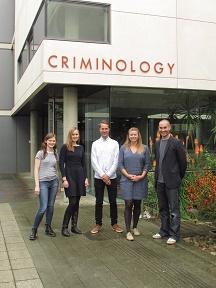Comparative Penology Project
 |  |
The Comparative Penology Groupis working on a five-year European Research Council (ERC) funded project titled:
 'Penal policymaking and the prisoner experience: a comparative analysis'.
'Penal policymaking and the prisoner experience: a comparative analysis'.
At its core, the project aims to interrogate the Nordic exceptionalism thesis – put at its simplest, the idea that punishment practices in the Nordic (inclusionary) countries are more liberal and humane than those in neo-liberal (exclusionary) nations. For a summary of our research project, please click here and to view the webinar that was used as part of the recruitment process, please clickhere. Some aspects of the original research proposal have changed since it was submitted in 2014, but its structure and aims remain the same.
The research draws upon and enhances a framework that has recently been developed by Ben Crewe and various colleagues in a couple of publications to conceptualise different aspects of the prison experience, formed around the concepts of the ‘depth’, ‘weight’, ‘tightness’ and ‘breadth’ of imprisonment.
In brief:
‘depth’ refers mainly to matters of security, control, and the various sensations of feeling a long way from freedom;
‘weight’ relates mainly to interpersonal treatment and conditions, and the level of oppressiveness that they generate;
the concept of ‘tightness’ seeks to capture the reach, grip and invasiveness of forms of psychological power, including the demand that prisoners monitor their own conduct;
and ‘breadth’ refers to the reach and impact of the sentence beyond the prison, for example, the forms of stigma and psychological disability that ex-prisoners carry with them on release.
With such considerations in mind, the research programme consists of four sub-studies, each taking place within England & Wales and Norway:
- first, a study of penal policymaking and the ‘penal field’ – that is, the set of players and processes that shape penal policy and practice;
- second, an exploration of the texture of imprisonment for women and imprisoned sex offenders, with a particular focus on how these prisoners experience penal power and how it shapes their everyday social world within the prison;
- third, a study of how prisoners experience points of entry into and exit from the system; and,
- fourth, a study of the ‘deep end’ of each prison system, that is, the units holding prisoners considered to be most dangerous or difficult to manage, in the most secure and controlled conditions.
Research is now underway in all four sub-studies, in what has been an extremely intense initial period of fieldwork. Most of our time so far has been spent embarking on the ‘entry-exit’ study, in a range of local prisons, interviewing prisoners shortly after they come into custody and observing reception and release processes. At the same time, in England & Wales, we have made considerable headway in interviewing prisoners in the four Close Supervision Centres.
